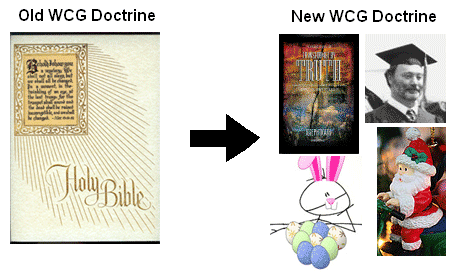
COGwriter
Today is what many who profess Christ call Easter.
But did you know that what is now called Easter really was the result of a change in the date of Passover combined with the addition of pagan symbolism? And that “Easter” is supposedly actually Passover?
As almost everyone knows, Jesus kept the Passover, from the time of His youth. Luke records:
His parents went to Jerusalem every year at the Feast of the Passover. And when He was twelve years old, they went up to Jerusalem according to the custom of the feast (Luke 2:41-42).
Jesus continued to keep the Passover throughout His entire life. He kept it once per year. Passover was an annual event for Him (Luke 21:41) and others (Exodus 13:10) and was observed on the fourteenth day of the month of the first month (called Abid in Deuteronomy 16:1 or Nisan in Esther 3:7):
On the fourteenth day of the first month at twilight is the LORD’s Passover (Leviticus 23:5).
And Jesus had his disciples also keep it:
Then came the Day of Unleavened Bread, when the Passover must be killed. And He sent Peter and John, saying, “Go and prepare the Passover for us, that we may eat.” So they said to Him, “Where do You want us to prepare?” And He said to them, “Behold, when you have entered the city, a man will meet you carrying a pitcher of water; follow him into the house which he enters. Then you shall say to the master of the house, ‘The Teacher says to you, “Where is the guest room in which I may eat the Passover with My disciples?” ‘ Then he will show you a large, furnished upper room; there make ready.” So they went and found it just as He had said to them, and they prepared the Passover (Luke 22:7-13).
On Jesus’ last Passover as a human being, He changed many of the practices associated with it. But He in no way suggested that it was not an annual Passover, nor did He change the time of day until the morning.
Then how did Easter-Sunday come about?
Samuele Bacchiocchi noted that the change to Easter-Sunday and to a weekly Sunday was due to persecution (the new Gentile hierarchy he is referring to are Greek bishops in Jerusalem, which took over after the rebellion was crushed):
The actual introduction of Easter-Sunday appears to have occurred earlier in Palestine after Emperor Hadrian ruthlessly crushed the Barkokeba revolt (A.D. 132-135)…
The fact that the Passover controversy arose when Emperor Hadrian adopted new repressive measures against Jewish religious practices suggests that such measures influenced the new Gentile hierarchy to change the date of Passover from Nisan 14 to the following Sunday (Easter-Sunday) in order to show separation and differentiation from the Jews and the Jewish Christians…
A whole body of Against the Jews literature was produced by leading Fathers who defamed the Jews as a people and emptied their religious beliefs and practices of any historical value. Two major causalities of the anti-Jewish campaign were Sabbath and Passover. The Sabbath was changed to Sunday and Passover was transferred to Easter-Sunday.
Scholars usually recognize the anti-Judaic motivation for the repudiation of the Jewish reckoning of Passover and adoption of Easter-Sunday instead. Joachim Jeremias attributes such a development to “the inclination to break away from Judaism.” In a similar vein, J.B. Lightfoot explains that Rome and Alexandria adopted Easter-Sunday to avoid “even the semblance of Judaism” (Bacchiocchi S. God’s Festival in Scripture and History. Biblical Perspectives. Befriend Springs (MI), 1995, pp. 101,102,103).
It is possible that the Roman “bishop” Telesphorus was the first Roman who made a change to Sunday Passover around 135 A.D. to attempt to distance himself from the Jews in Rome. If he was the first Roman leader who did it, and if he thought that this would spare his life, he was wrong as he was apparently later killed by the Roman authorities (circa 136 A.D.). On the other hand, it is perhaps more likely that Hyginus, who was apparently Greek decided to introduce the Passover Sunday tradition in Rome, perhaps to direct the wrath of the anti-Jewish Roman authorities away from those who professed Christ but avoided some of the outward signs of Judaism.
Christian leaders that refused to switch from Passover on the 14th to a Sunday observance have been labeled Quartodecimans (Latin for fourteenth) by most historians—with the bulk of them apparently being in Asia Minor near the end of the second century.
Around 155 A.D. Polycarp of Smyrna went to Rome to deal with various heretics and he tried to persuade the bishop not to observe Passover on Easter Sunday. Irenaeus records this:
And when the blessed Polycarp was sojourning in Rome in the time of Anicetus, although a slight controversy had arisen among them as to certain other points…For neither could Anicetus persuade Polycarp to forego the observance [in his own way], inasmuch as these things had been always observed by John the disciple of our Lord, and by other apostles with whom he had been conversant; nor, on the other hand, could Polycarp succeed in persuading Anicetus to keep [the observance in his way], for he maintained that he was bound to adhere to the usage of the presbyters who preceded him. And in this state of affairs they held fellowship with each other; and Anicetus conceded to Polycarp in the Church the celebration of the Eucharist, by way of showing him respect (Irenaeus. FRAGMENTS FROM THE LOST WRITINGS OF IRENAEUS. Translated by Alexander Roberts and James Donaldson. Excerpted from Volume I of The Ante-Nicene Fathers (Alexander Roberts and James Donaldson, editors); American Edition copyright © 1885. Electronic version copyright © 1997 by New Advent, Inc).
Over time, instead of being a holy day in memorial to Christ’s sacrifice, Easter became a resurrection holiday.
The Catholic writer Eusebius recorded that Polycrates of Ephesus, wrote the following to the Roman Bishop Victor who wanted all who professed Christ to change Passover from the 14th of Nisan to Sunday:
We observe the exact day; neither adding, nor taking away. For in Asia also great lights have fallen asleep, which shall rise again on the day of the Lord’s coming, when he shall come with glory from heaven, and shall seek out all the saints. Among these are Philip, one of the twelve apostles, who fell asleep in Hierapolis; and his two aged virgin daughters, and another daughter, who lived in the Holy Spirit and now rests at Ephesus; and, moreover, John, who was both a witness and a teacher, who reclined upon the bosom of the Lord, and, being a priest, wore the sacerdotal plate. He fell asleep at Ephesus. And Polycarpin Smyrna, who was a bishop and martyr; and Thraseas, bishop and martyr from Eumenia, who fell asleep in Smyrna. Why need I mention the bishop and martyr Sagaris who fell asleep in Laodicea, or the blessed Papirius, or Melito, the Eunuch who lived altogether in the Holy Spirit, and who lies in Sardis, awaiting the episcopate from heaven, when he shall rise from the dead? All these observed the fourteenth day of the passover according to the Gospel, deviating in no respect, but following the rule of faith.And I also, Polycrates, the least of you all, do according to the tradition of my relatives, some of whom I have closely followed. For seven of my relatives were bishops; and I am the eighth. And my relatives always observed the day when the peopleput away the leaven. I, therefore, brethren, who have lived sixty-five years in the Lord, and have met with the brethren throughout the world, and have gone through every Holy Scripture, am not affrighted by terrifying words. For those greater than I have said ‘ We ought to obey God rather than man’(Eusebius. Church History, Book V, Chapter 24. Translated by Arthur Cushman McGiffert. Excerpted from Nicene and Post-Nicene Fathers, Series Two, Volume 1. Edited by Philip Schaff and Henry Wace. American Edition, 1890. Online Edition Copyright © 2004 by K. Knight).
Notice that Polycrates said that he and the other early church leaders (all of whom are considered to be saints by the Roman Catholics and the Eastern Orthodox like the Apostles Philip and John, and their successors like Polycarp, Thraseas, Sagaris, Papirius, Melito) would not deviate from the Bible, and that they knew the Bible taught them to keep the Passover on the correct date, and not on a Sunday. Also notice that they always observed the day when the people put away the leaven. Polycrates also reminded the Roman bishop that true followers of Christ “obey God rather than men” (Acts 5:29).
The Orthodox Church reports this brief explanation in one of its timelines:
193 A.D. – Council of Rome, presided over by Bishop Victor, condemns the celebration of Pascha on Nisan 14, and addresses a letter to Polycrates of Ephesus and the Churches in Asia.
193 A.D. – Council of Ephesus, presided over by Bishop Polycrates, and attended by several bishops throughout Asia, reject the authority of Victor of Rome, and keep the Asian paschal tradition (Markou, Stavros L. K.An Orthodox Christian Historical Timeline. Copyright © 2003 OrthodoxFaith.com).
Many decided to make the Roman/Greek change, with probably those in Alexandria the most supportive (to see what happened in Palestine, please see the article The Ephesus Church Era). It was those in Asia Minor who mainly refused to switch Passover to Sunday (as well as those areas that did not have Roman or Alexandrian contact).
Even over a century later, there still were those, even amongst the Greco-Roman confederation that wanted to observe Passover on the 14th of Nisan. This was distressing to Emperor Constantine and he had this as an agenda item for the Council of Nicea that he had convened in 325 A.D.:
…the emperor…convened a council of 318 bishops…in the city of Nicea…They passed certain ecclesiastical canons at the council besides, and at the same time decreed in regard to the Passover that there must be one unanimous concord on the celebration of God’s holy and supremely excellent day. For it was variously observed by people… (Epiphanius. The Panarion of Epiphanius of Salamis, Books II and III (Sects 47-80), De Fide). Section VI, Verses 1,1 and 1,3. Translated by Frank Williams. EJ Brill, New York, 1994, pp.471-472).
A Sunday date was selected, instead of Nisan 14 (which can fall on any day of the week).
According to Eusebius’ Life of Constantine, Book III chapter 18, the Roman emperor Constantine declared:
Let us then have nothing in common with the detestable Jewish crowd; for we have received from our Saviour a different way.
I do not recall Jesus indicating that Jews were detestable (He was a Jew) or that He changed the date of Passover. But apparently sun-worshipping Constantine felt otherwise. And the Sunday observance is now known as Easter. But because sun-worshiping practices and the avoidance of practice that were considered too “Jewish” that is really why Easter is observed when it is.
However, Constantine’s declarations did not stop everyone from properly observing Passover. Because of this, a later Roman Emperor decreed the death penalty:
Edicts of Theodosius against the heretics, A.D. 380-394…Theodosius…decreed that…by the death of the offender; and the same capital punishment was inflicted on the Audians, or Quartodecimans, who should dare to perpetrate the atrocious crime of celebrating on an improper day the festival of Easter {Passover} (Gibbon E. Decline and Fall of the Roman Empire, Volume III, Chapter XXVII. ca. 1776-1788).
Is killing those that followed the example of Jesus and John to observe the Passover on the 14th instead of Easter Sunday a sign of a true Christian leader or a sign of supporting antichrist? Yet that is the type of persecution that true followers of Christ had to put up with.
Another Greco-Roman supporter wrote this about the Council of Nicea a few decades later:
Three hundred Fathers or even more gathered together in the land of Bithynia and ordained this by law; yet you disdain their decrees. You must choose one of two courses: either you charge them with ignorance for their want of exact knowledge on this matter, or you charge them with cowardice because they were not ignorant, but played the hypocrite and betrayed the truth. When you do not abide by what they decreed, this is exactly the choice you must make. But all the events of the Council make it clear that they showed great wisdom and courage at that time. The article of faith they set forth at the Council show how wise they were…At that time the whole synodal gathering, welded together from these champions, along with their definition of what Christians must believe, also passed a decree that they celebrate the paschal feast in harmony together. They refused to betray their faith in those most difficult times [of persecution]; would they sink to pretense and deceit on the question of the Easter observance? (5) Look what you do when you condemn Fathers so great, so courageous, so wise (John Chrysostom. Homily III Against the Jews, III:3,4-5. Preached at Antioch, Syria in September, 386 AD).
So it is an article of faith that Greco-Roman Catholic bishops had the authority to change the scriptural date of Passover and make it an Easter celebration, even though one of the main reasons that Constantine wanted it was to have nothing in common with those he called the detestable Jewish crowd?
But this was simply not the faith of the true second century Christians in Asia Minor as Polycrates testified.
Easter itself is not a Christian term, and its celebration contains pagan elements. The Catholic Encyclopedia notes:
The English term, according to the Ven. Bede (De temporum ratione, I, v), relates to Estre, a Teutonic goddess of the rising light of day and spring…Easter is the principal feast of the ecclesiastical year. Leo I (Sermo xlvii in Exodum) calls it the greatest feast (festum festorum), and says that Christmas is celebrated only in preparation for Easter…The connection between the Jewish and the Christian Pasch explains the movable character of this feast. Easter has no fixed date, like Christmas, because the 15th of Nisan of the Semitic calendar was shifting from date to date on the Julian calendar. Since Christ, the true Paschal Lamb, had been slain on the very day when the Jews, in celebration of their Passover, immolated the figurative lamb, the Jewish Christians in the Orient followed the Jewish method…For this observance they claimed the authority of St. John and St. Philip.
In the rest of the empire another consideration predominated. Every Sunday of the year was a commemoration of the Resurrection of Christ, which had occurred on a Sunday. Because the Sunday after 14 Nisan was the historical day of the Resurrection, at Rome this Sunday became the Christian feast of Easter…
Men and women…In the Neumark (Germany) on Easter Day the men servants whip the maid servants with switches; on Monday the maids whip the men. They secure their release with Easter eggs. These customs are probably of pre-Christian origin (Reinsberg-Düringsfeld, Das festliche Jahr, 118)…
The Easter RabbitThe Easter Rabbit lays the eggs, for which reason they are hidden in a nest or in the garden. The rabbit is a pagan symbol and has always been an emblem of fertility (Simrock, Mythologie, 551)…
The Easter Fire The Easter Fire is lit on the top of mountains (Easter mountain, Osterberg) and must be kindled from new fire, drawn from wood by friction (nodfyr); this is a custom of pagan origin in vogue all over Europe, signifying the victory of spring over winter
(Holweck F. G. Transcribed by John Wagner and Michael T. Barrett. Easter. The Catholic Encyclopedia, Volume V. Copyright © 1909 by Robert Appleton Company. Online Edition Copyright © 2003 by K. Knight. Nihil Obstat, May 1, 1909. Remy Lafort, Censor. Imprimatur. +John M. Farley, Archbishop of New York).
Thus, the Romans admit that the name Easter is the name of a pagan goddess, many of its practices are of pagan origin, and that the churches in Asia Minor (which they call the Orient) continued to observe Passover on the date that the Jews did, Nisan 14.
The Bible itself also condemns certain practices, now associated with Easter, such as hot Easter buns/cakes (Jeremiah 7:14), the worship towards the sun in the east (Ezekiel 8:15-18), and the worship of Astarte/Ishtar/Ashtaroth (other spellings of the word Easter).
Even Protestant commentaries note that:
Jeremiah 7…Cakes to the queen of heaven (v. 18). Probably a reference to the Babylonian fertility-goddess Ishtar, goddess of the planet Venus (from The Wycliffe Bible Commentary, Electronic Database. Copyright (c) 1962 by Moody Press).
Jeremiah 7… What the sin is with which they are here charged-it is idolatry, v. 18. Their idolatrous respects are paid to the queen of heaven, the moon, either in an image or in the original, or both. They worshipped it probably under the name of Ashtaroth, or some other of their goddesses (from Matthew Henry’s Commentary on the Whole Bible: New Modern Edition, Electronic Database. Copyright (c) 1991 by Hendrickson Publishers, Inc.).
Thus, both Catholic and Protestant scholars acknowledge that Easter/Ishtar/Ashtaroth worship contains pagan elements.
The biblical Passover has to do with the Lamb of God being killed for our sins. Easter, which is named after the pagan goddess Ishtar, has to do with a fertility festival involving rabbits and looking to the east in early morning as pagans did–adding a few elements involving Christ does not make it truly Christian.
Those who actually keep Passover can have a much better understanding of the plan of God than those who follow supposedly “Christianized” pagan holidays (this point is discussed near the end of the article titled Is There “An Annual Worship Calendar” In the Bible?).
If you observe Easter, why do you do it?
The Apostle Paul taught, “Prove all things” (1 Thes 5:21 KJV).
Regarding Passover and Easter did you “prove” which one the Bible and early Christians show should be observed?
Should you obey men rather than God and observe Easter? Or should you obey God rather than men and observe Passover (which occurs next month)?
Please be like the Bereans who “searched the Scriptures daily to find out whether these things were so” (Acts 17:11).
Several articles of related interest may include:
What Happened in the Crucifixion Week? How long are three days and three nights? Did Jesus die on “Good Friday”? Was the resurrection on Sunday? Do you really know? Who determined the date of Easter?
Did Early Christians Celebrate Easter? If not, when did this happen? What do scholars and the Bible reveal?
Is There “An Annual Worship Calendar” In the Bible? This paper provides a biblical and historical critique of several articles, including one by WCG which states that this should be a local decision. What do the Holy Days mean? Also you can click here for the calendar of Holy Days.
Passover and the Early Church Did the early Christians observe Passover? What did Jesus and Paul teach? Why did Jesus die for our sins?
Melito’s Homily on the PassoverThis is one of the earliest Christian writings about the Passover. This also includes what Apollinaris wrote on the Passover as well.
Should Christians Keep the Days of Unleavened Bread? Do they have any use or meaning now? This article supplies some biblical answers.









